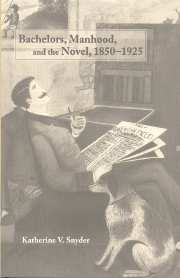Book contents
- Frontmatter
- Contents
- Acknowledgments
- Abbreviations
- Introduction
- Chapter 1 Trouble in paradise: bachelors and bourgeois domesticity
- Chapter 2 Susceptibility and the single man: the constitution of the bachelor invalid
- Chapter 3 An artist and a bachelor: Henry James, mastery, and the life of art
- Chapter 4 A way of looking on: bachelor narration in Joseph Conrad's Under Western Eyes
- Chapter 5 The necessary melancholy of bachelors: melancholy, manhood, and modernist narrative
- Afterword
- Notes
- Bibliography
- Index
Chapter 3 - An artist and a bachelor: Henry James, mastery, and the life of art
Published online by Cambridge University Press: 22 September 2009
- Frontmatter
- Contents
- Acknowledgments
- Abbreviations
- Introduction
- Chapter 1 Trouble in paradise: bachelors and bourgeois domesticity
- Chapter 2 Susceptibility and the single man: the constitution of the bachelor invalid
- Chapter 3 An artist and a bachelor: Henry James, mastery, and the life of art
- Chapter 4 A way of looking on: bachelor narration in Joseph Conrad's Under Western Eyes
- Chapter 5 The necessary melancholy of bachelors: melancholy, manhood, and modernist narrative
- Afterword
- Notes
- Bibliography
- Index
Summary
London is on the whole the most possible form of life. I take it as an artist and a bachelor; as one who has the passion of observation and whose business is the study of human life … I had complete liberty, and the prospect of profitable work … I took possession of London.
Thus wrote Henry James in his first American journal, glancing backward in 1881 to his 1876 arrival in England. In representing himself as an artist and a bachelor, James describes a double life divided between “passion” and “business,” yet joined by the single purpose of studious observation. The appositive structure of the second sentence seems to assign “passion” to the artist and “business” to the bachelor, suggesting a constitutive difference, a schism or struggle between two of the many sources of identity that informed James's sense of himself as an author. Yet the artist and the bachelor seem here to be more compatible than not. They are joined in harmony rather than in conflict: united by the shared object of their gaze and particularly by the intensity that their ways of seeing have in common. The artist and the bachelor share a fascination with and dedication to that encompassing other, London, which is itself a “form of life.”
- Type
- Chapter
- Information
- Bachelors, Manhood, and the Novel, 1850–1925 , pp. 104 - 140Publisher: Cambridge University PressPrint publication year: 1999

